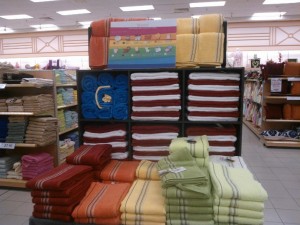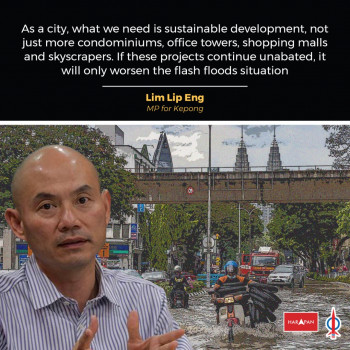by Steven Sim
 We live in a world terribly saturated with brands. Today, different commodities scream at us everywhere through their brands, whether in the morning newspaper or in the evening news on TV, on billboards along the road or on the radio while we are driving, on bills and posters or on website banners and Facebook and Twitter.
We live in a world terribly saturated with brands. Today, different commodities scream at us everywhere through their brands, whether in the morning newspaper or in the evening news on TV, on billboards along the road or on the radio while we are driving, on bills and posters or on website banners and Facebook and Twitter.
The hunger of a consumerist society is exploited through the competition of brands, each offering not only a differentiated product quality, but also a unique user experience. One drinks a particular brand of cola not merely because it tastes better than the other brands but because it is cool to drink this brand. One drives a particular brand of car not because it has better performance than another brand, but because driving this brand is a symbol of success. Brands today therefore promise to deliver more than quality, yet, alas they often fail to deliver even quality.
Malaysia Inc.
Dr. Mahathir Mohammed popularised the concept of Malaysia Inc., a Corporate Malaysia where the partnership between the government and private sector will result in a more efficient public delivery service, higher investment, quicker economic growth and most importantly, the creation of new wealth.
During the time of Mahathir, Malaysia saw rapid development through mega construction projects and cheap foreign labours, the “shortcut” strategy to boost a country’s economy.
Malaysians were bedazzled for a while, there were bread – business was good – and there were circuses – we’ve got the tallest building in the world! While there was new wealth to be sure, income disparity grew, corruption and cronyism increased and democracy diminished in a country run like one’s own business.
Barry Wain, former editor of the Asian Wall Street Journal, said that through Mahathir’s 22 years of premiership, Malaysia lost about RM100 billion in financial scandals.
22 years of running Malaysia like one’s own company instead of governing a democracy definitely took a huge toll (forgive the pun) on us. It not only caused grave economic consequences, but also set the ground for later generation of politicians to similarly see the job of governing the country as that of running their fathers’ business.
And today, Prime Minister Najib Tun Razak seems to come home to roost on Mahathir’s Malaysia Inc.
A new product of Corporate Malaysia
Consider the latest product offering by the latest CEO of Malaysia Inc., branded “1Malaysia”.
Everywhere in the country, one will be bombarded with the ubiquitous number 1 in serif – the 1Malaysia logo. We see it in in the morning newspaper and the evening news on TV, on billboards along the road and on the radio while we are driving, on bills and posters, on websites, Facebook and Twitter, and in speeches and in acts.
At government functions, one will not fail to notice the comedic acts of cohorts of leaders and officials pointing their index fingers upwards, while repeating the mantra “Satu Malaysia, Satu Malaysia, Satu Malaysia”.
But the explosion of 1Malaysia brand does not stop there. During the many by-elections in the past years, we see buses carrying 1Malaysia agents, dressed from top to toe, including capped, in the brand appearing to campaign for the 1Malaysia party, Barisan Nasional.
No one knew where these agents came from but they brought with them an assortment of 1Malaysia brand goods to be distributed for free to the voters. There were school bags, shirts and caps, umbrellas, fans, and even tumblers and lunch boxes.
As if the consumer goods market is not enough, the proprietor of 1Malaysia brand launched 1Malaysia email service and opened 1Malaysia toilets. The list of goods and services under the 1Malaysia brand goes on.
1Malaysia – the latest circus in town
No one knows what exactly is 1Malaysia given that its supposed advocacy of multiracialism is an irony to the racist party upholding it. But we are dealing with something more than an oxymoron. The Barisan Nasional government has reduced this potentially great nation into a commodity brand, and what is worse, a brand for low quality “Made in China” sundry shop goods – school bags, tumblers, lunch boxes, t-shirts and caps.
Perhaps, the CEO and directors of Malaysia Inc. realised that the tallest buildings and magnificent palaces can no longer capture the imaginations of ordinary Malaysians left out of the new wealth created through Mahathirism.
Hence, new CEOs after Mahathir, Pak Lah and now Najib, tried new ways to appease the people with their own versions of bread and circuses. Pak Lah’s short-lived tenure – thanks not less to Mahathir – could not produce anything lasting.
Under Najib however, 1Malaysia is the latest circus to come to town, trying to bedazzle Malaysians into yet another phase of intoxicated submission to Barisan Nasional. If 1Malaysia is a brand, then CEO Najib is very successful indeed.
The 1Malaysia brand is everywhere, from TV to “tupperwares” to toilets. But do we really want our beloved country Malaysia to be merely a brand for substandard “made in China” plastic products?
This is the 49th anniversary of Hari Malaysia; what is a better time than now to ask ourselves if we are willing to go through another phase of missed opportunities to make Malaysia into a great nation? Are we still willing to be lured by the bread and circuses to once again succumb to Malaysia Inc. whose business-model neither include nor profit most of us? Think carefully whenever you check out a brand.
Selamat Hari Malaysia. -The Rocket
Steven Sim is a Councillor of the Majlis Perbandaran Seberang Perai (MPSP), Penang and the Publicity Secretary of DAP Socialist Youth (DAPSY) Penang.




Pingback: Is a country a brand? « Steven Sim
Pingback: Don’t be Duped by BN’s Bread and Circuses